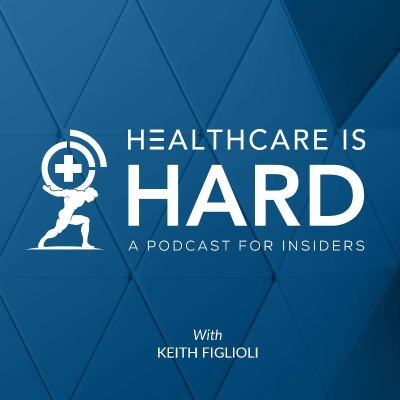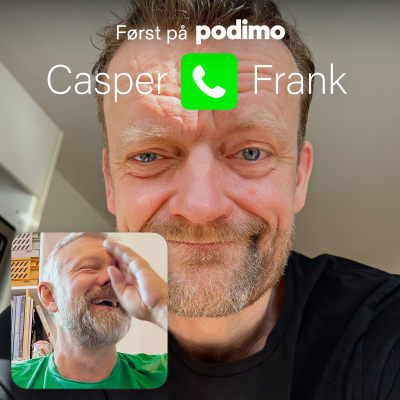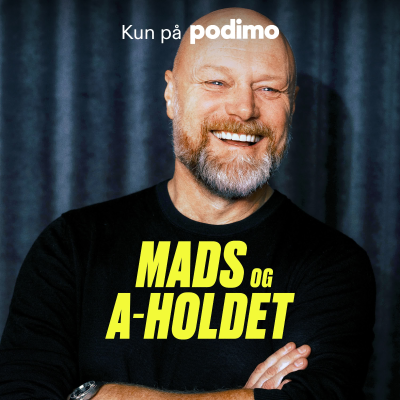
Healthcare is Hard: A Podcast for Insiders
Podcast af LRVHealth
Begrænset tilbud
1 måned kun 9 kr.
Derefter 99 kr. / månedIngen binding.

Mere end 1 million lyttere
Du vil elske Podimo, og du er ikke alene
Bedømt til 4,7 stjerner i App Store
Læs mere Healthcare is Hard: A Podcast for Insiders
Healthcare is Hard: A Podcast for Insiders views healthcare transformation through the lens of prominent leaders across the industry. Through intimate one-on-one discussions with executives, policy advisors, and other “insiders,” each episode dives deep into the pressing challenges that come with changing how we care for people. Hear the unique perspectives of these industry leaders to get a better understanding of what is happening today, the challenges across the healthcare ecosystem, and how innovation is really shaping the future of healthcare delivery.
Alle episoder
82 episoderDr. Josh Mandel says his first love was software. But on a whim, while studying computer science and software engineering at MIT, he took a course that opened his eyes to the world of medicine and genetics. It changed the trajectory of his career away from software – but only temporarily. He entered medical school after earning a bachelor’s degree in computer science and began rotating through Boston-area hospitals at the same time Meaningful Use accelerated adoption of electronic health records. With a background in computer science and training as a physician, Josh understood the promise of EHRs, how medical professionals would actually use them, and how to make them better. Based on his unique combination of expertise, Josh took it upon himself to begin making improvements to the systems at the hospital where he worked. Nearly two decades later, Josh is now Chief Architect for Health at Microsoft Research. In this role, he focuses on developing an ecosystem for health apps with access to clinical and research data, leading standards development for data access, authorization, and app integration. For the third and last episode in this Healthcare is Hard series, Keith Figlioli spoke to Josh about data interoperability and emerging technologies. This conversation follows previous episodes with Epic’s head of R&D, Seth Hain [https://www.linkedin.com/in/seth-hain-12760647/] in Part 1, and the Interoperability Practice Lead at HTD Health, Brendan Keeler [https://www.lrvhealth.com/podcast/emerging-technologies-part-2-past-present-future-of-healthcare-interoperability-with-htd-healths-brendan-keeler/] – also known as the “Health API Guy” – in Part 2. Some of the topics Keith and Josh discussed include: * The standards landscape. At Keith’s request to explain the evolution of health IT standards as if he were talking to a seven-year-old, Josh breaks it down in simple terms. He outlines how structured data related to things like allergies, medications, and vital signs are well standardized today, while newer data types like genomics and imaging remain fragmented. He also explains the role of HL7, FHIR, and the Argonaut Project in shaping interoperability. * How AI flips the script on standards. Josh says generative AI changed the way he thinks about engaging with the standards community. After getting an early preview of GPT-4 a few years ago, he realized that it would dramatically reduce the value of detailed data structure standards over time. He says that as AI becomes better at interpreting unstructured data, the focus will shift from formatting to governance – who can access what, and under what conditions. He described the concept of “language first interoperability” as one initiative he’s working on where automated agents query each other in the equivalent of an email or chat thread. Instead of exposing extensive details upfront, agents that can access unstructured data and understand things like medical necessity and other guardrails can send messages to each other until they make a conclusion about a specific task. This technology will increase the value of standards for data access and privacy, while reducing the focus on interoperability. * Advice for startups. In a fast-moving landscape, Josh urges startups to “build and explore.” He emphasizes the importance of staying close to customers, iterating quickly, and leveraging today’s best models while keeping an eye on what’s coming next. His advice: don’t get bogged down in yesterday’s limitations—focus on unlocking value now and adapting as the technology evolves. To hear Dr. Mandel and Keith discuss these topics and more, listen to this episode of Healthcare is Hard: A Podcast for Insiders.
Brendan Keeler’s path into healthcare interoperability has been anything but straightforward. After early stints implementing Epic in the U.S. and Europe, he helped hundreds of startups connect to provider and payer systems at Redox, Zus Health and Flexpa before taking the reins of the Interoperability Practice at HTD Health. Along the way, his Health API Guy blog turned dense policy updates into plain-language guides, earning a following among developers, executives and regulators. In this episode, Keith Figlioli sits down with Keeler to examine the “post-Meaningful-Use” moment. They discuss how national networks like Carequality and CommonWell solved much of the provider-to-provider exchange problem, only to expose new gaps for payers, life-science firms and patients. Keeler says the real action right now is in three places where the biggest, most dramatic changes are about to happen: * Antitrust pressure on dominant EHRs. Epic’s push into ERP, payer platforms and life-sciences services could trigger “leveraging” claims that force unbundling, similar to cases already moving through federal court. * Information-blocking enforcement. Recent lawsuits show courts siding with smaller vendors when incumbents restrict data access, a trend Keeler believes could unwind long-standing moats around systems of record. * A CMS-led shift from policy to execution. With ONC budgets flat, Keeler sees CMS using its purchasing power to unblock Medicare claims data at the point of care, expand Blue Button APIs, and accelerate work on a national provider directory, digital ID and trusted exchange frameworks. Keeler’s optimism is pragmatic. AI agents may someday chip away at entrenched EHR “data gravity,” but real progress, he says, will come from steady, bipartisan layering of HIPAA, Cures Act and TEFCA foundations. He also pushes back on venture capital’s “system-of-action” thesis. Enterprise EHRs remain sticky because switching costs—massive data migration and workflow retraining—are measured in decades, not funding cycles. AI could reduce these problems, but only slowly and only if underpinned by trusted exchange standards. Zooming out, Keeler describes a policy arc that starts with provider-to-provider exchange, widens to payer and patient access, and ultimately points toward a nationwide digital ID that could streamline consent and credentialing. For innovators, his north star is clear: build for identity-verified, standards-based exchange; assume open APIs will become table stakes; and judge success by the friction you subtract from everyday care—not by how flashy the demo is. To hear Brendan Keeler and Keith unpack these issues, listen to this episode of Healthcare is Hard: A Podcast for Insiders. Please note that this episode was recorded earlier this summer, before the CMS meeting, and that some developments have occurred since then.
Seth Hain has spent two decades at Epic, watching the electronic health record evolve from digital filing cabinet to care-delivery platform. Now he thinks the entire stack of software is being re-imagined, only this time it isn’t mobile or cloud driving the change, but generative AI. In a conversation with Keith Figlioli, Hain explains how new tooling, cheaper compute and larger context windows are pushing healthcare toward an “agentic” era, where software can collect context, ask clarifying questions, and tee up next-best actions before the clinician even walks into the room. He argues that the real breakthrough isn’t documentation speed-ups, but the chance to embed a learning health system directly into daily workflows. Central to that vision is Cosmos—a dataset of 15 billion encounters from more than 250 health systems that is already powering condition-specific growth charts and real-world evidence studies. The next step: piping those insights back to the bedside at scale. Yet technology alone won’t deliver. Hain and Figlioli dig into: * A real “health grid” is starting to form. Hain envisions a network that connects life-science companies, health-system clinicians and tech builders so discoveries can move from bench to bedside without today’s data hand-offs and delays. Epic’s role is to lower the technical friction, so researchers can spot patterns, then surface the insight inside everyday workflows. The long-term bet: once the pipes are in place, bespoke therapies (even gene treatments) could be developed and delivered in one coordinated loop rather than siloed phases. * Agentic AI is rewriting the user interface, not just speeding up notes. Hain argues the shift from cloud/mobile to generative agents is “noticeably different” because large-context models can listen, remember, reason and suggest next steps in real time. That opens the door to smart exam rooms that combine ambient voice, vision and wearables, and to workflows that provide clinicians with a complete picture before they walk in the patient's room. As UI layers splinter, the possibility of deep insights from longitudinal data is becoming reality, and vendors who overlook this shift will quickly fall behind. * AI as a Force Multiplier for a Shrinking Workforce. With demand still rising faster than the workforce can grow, Hain sees AI as a supplement, not a head-count replacement: think follow-up calls, patient triage or ambient documentation that frees staff to practice at the top of their license. But he’s clear that hype won’t bend the curve; the industry has to measure quality gains, time saved and patient outcomes before claiming ROI. Governance must evolve in parallel so speed doesn’t outrun safety or equity and incumbents that ignore this shift do so at their peril. Throughout, Hain balances optimism with realism: the models are improving fast, but value will hinge on measurable outcomes, thoughtful deployment, and collaboration across an industry that often works in silos. To hear Seth Hain and Keith discuss these topics and more, listen to this episode of Healthcare is Hard: A Podcast for Insiders.
Brian D. Pieninck didn’t take a conventional path to healthcare leadership. He started his career as an 18-year-old IT contractor and spent two decades working across the industry before becoming President and CEO of CareFirst Blue Cross Blue Shield. He now also serves as Chair of the Blue Cross Blue Shield Association, bringing both local and national perspective to the role. In this episode, Keith Figlioli speaks with Pieninck about what it means to lead a not-for-profit regional payer at a time of seismic change. With 3.6 million members and coverage that spans commercial, Medicare, and Medicaid, CareFirst has become a vital part of healthcare access and infrastructure across the Mid-Atlantic. Pieninck reflects how demographic shifts, rising costs, and policy uncertainty are challenging how healthcare organizations evolve, while staying focused on long-term outcomes. Pieninck and Keith discuss: * Advancing health equity as part of the community. Pieninck sees CareFirst not just as a payer, but as part of the region’s civic infrastructure, creating economic opportunities, delivering care through primary and urgent care locations, and supporting long-term health equity initiatives across Maryland, DC, and Northern Virginia. * Medicaid coverage and its downstream impact. With nearly half of children in Maryland and DC relying on Medicaid, Pieninck warns that cuts or disruptions don’t reduce the need for care; they push it into higher-cost, less coordinated settings like emergency departments. * The balloon effect in healthcare financing. As costs are squeezed in one area, they inflate in another. Pieninck challenges the idea that market forces can realign care efficiently. He discusses how efforts to contain spending in one area often lead to inefficiencies elsewhere, and the system ends up paying more later because early, lower-cost interventions are underfunded or inaccessible. * Innovation that simplifies the system. Through CareFirst’s innovation arm, Healthworx, Pieninick highlights the need to design a system that works for people by reducing complexity and embedding support directly into the healthcare experience. * AI and infrastructure: opportunity meets readiness. With nearly three decades of experience on the technology side of healthcare, Pieninck is bullish on AI’s potential—especially now that it's available at a price point that can scale. Real progress, he notes, will depend on thoughtful governance, better interoperability, and models built around human needs. This episode offers a look at how one regional plan is thinking through the tensions between access, affordability and innovation, and what that means for the broader system. To hear Brian D. Pieninck and Keith discuss these challenges in depth, listen to this episode of Healthcare is Hard: A Podcast for Insiders.
Kody Kinsley has been called many things—operator, innovator, Medicaid “nerd”—but above all, he’s a fierce advocate for the health and well-being of the populations Medicaid serves. Now a senior advisor at the Milken Institute and recently North Carolina’s Secretary of Health and Human Services, Kinsley joins Keith Figlioli for a wide-ranging conversation about how Medicaid works, why it matters, and where innovation is reshaping its future. A native of North Carolina, Kinsley brings personal experience and professional depth to his perspective. Growing up uninsured, he watched his mother navigate pediatric clinics, sliding-scale providers, and supply closets offering free samples to keep her kids healthy. That formative exposure ultimately propelled him into a career spanning healthcare operations, behavioral health, public policy, and government leadership. As North Carolina’s health secretary, Kinsley led one of the country’s largest and most complex human services agencies, overseeing everything from Medicaid operations and public health to psychiatric hospitals and child welfare. He played a central role in advancing Medicaid expansion in the state—an achievement shaped by bipartisan negotiation, careful balancing of federal and state resources, and a deep understanding of the healthcare landscape. In this episode, Kinsley and Keith cover: * The structural realities behind state Medicaid programs. Kinsley describes how mega-agencies like North Carolina’s bring together financing, public health, regulation, and direct care delivery—touching millions of lives daily, often invisibly. * Federal-state dynamics and looming policy shifts. From federal match rates to provider taxes and budget triggers, Kinsley explains the intricacies of how money moves between federal and state governments—and what’s at stake when Congress debates Medicaid cuts or structural reforms. * The human cost behind budget debates. Behind every line item is a person: whether it’s dental coverage, hospice services, or in-home care, Kinsley argues that policymakers must weigh the downstream impacts of funding decisions on real lives and long-term system costs. * Bright spots and innovation. Kinsley highlights North Carolina’s “Healthy Opportunities” pilot—one of the first initiatives nationally to use Medicaid dollars for non-medical needs like food, housing, and transportation. Early results show promise, including improved outcomes and significant cost savings, suggesting a roadmap for other states. * Looking forward. While political winds may shift and financial pressures mount, Kinsley remains optimistic. He points to growing public support for Medicaid and hopes the nation can move beyond divisive debates over whether healthcare is a right or privilege—focusing instead on smarter, more sustainable ways to deliver care. To hear Kody Kinsley and Keith Figlioli unpack these topics and more, listen to this episode of Healthcare is Hard: A Podcast for Insiders.

Mere end 1 million lyttere
Du vil elske Podimo, og du er ikke alene
Bedømt til 4,7 stjerner i App Store
Begrænset tilbud
1 måned kun 9 kr.
Derefter 99 kr. / månedIngen binding.
Eksklusive podcasts
Uden reklamer
Gratis podcasts
Lydbøger
20 timer / måned

































